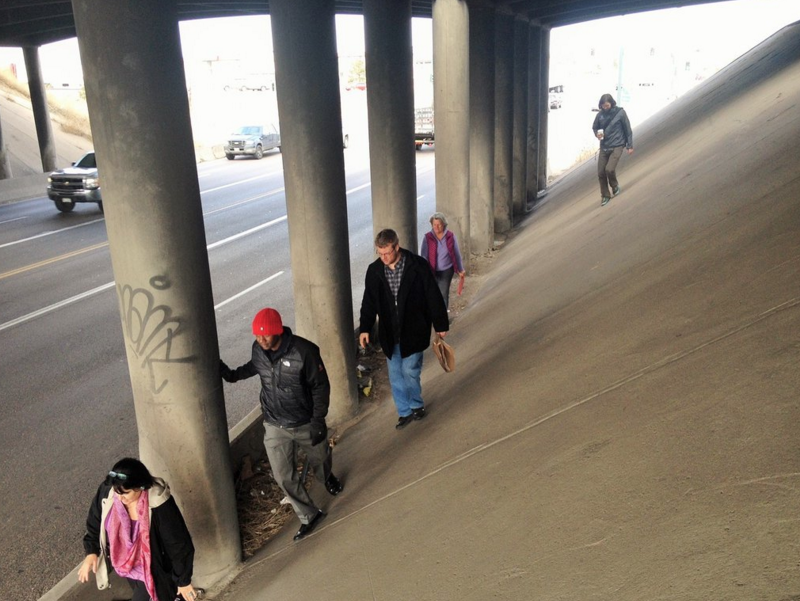A Pedestrian Plan Shaped By Pedestrian Advocates? No Thanks, Says Hancock

If you had a broken arm, you would probably see an orthopedist, because that’s what orthopedists do for a living. They are experts at healing bones.
If you’re running a city and have a broken pedestrian network, you would think that the city’s foremost independent expert on local pedestrian issues would have a seat at the table because, you know, they are the city’s foremost independent expert on local pedestrian issues.
Nope.
The Hancock administration recently blocked WalkDenver, the city’s pedestrian advocacy organization, from playing a major role in the city’s forthcoming pedestrian master plan, “Denver Moves: Pedestrian and Trails.” The walkability blueprint will be informed by a 20-person task force that will meet once a month for the next two years. According to the Hancock administration, there’s just no room on the task force for WalkDenver.
Why would the Hancock administration deny an organization whose mission is to make Denver the most walkable city in America a voice on the team charged with making Denver walkable? Here’s what Director of Community Planning and Development Brad Buchanan told Streetsblog in a statement:
Everyone in Denver cares a great deal about the future of our city. We’ve heard from several professional organizations, institutions, etc. who would like more representation. At the end of the day, the Denveright leadership team is striving to balance and accommodate expertise, advocacy and passion, while keeping committee sizes reasonable and productive.
Buchanan also said that the task force includes someone who also sits on WalkDenver’s board, as well as a rep from the Mayor’s Pedestrian Advisory Committee — a group of everyday residents with valuable perspective, but a group that’s also appointed by Mayor Michael Hancock.
“We’re firmly disappointed with the decision,” said WalkDenver Executive Director Gosia Kung. “We had advocated for the plan, we bring significant technical expertise, and we bring in data regarding pedestrian conditions. We felt like it was somewhat logical and straightforward to be involved in that process.”
WalkDenver’s credentials are undeniable. The organization has led the charge for a new policy to fund sidewalk construction citywide, which is gaining steam on the City Council. Its staffers were instrumental in creating WALKscope, an app that maps sidewalk conditions. Via crowdsourcing, WALKscope has compiled a more thorough sidewalk inventory than anything put together by Denver Public Works. WalkDenver has performed a deep analysis of the city’s pedestrian connections to transit, led tactical urbanism projects on Colfax, and surveyed the walkability of neighborhoods for years.
“We’ve had years of community conversations about the challenge and opportunities related to walkability in Denver already, and are very plugged in nationally to what other cities are doing to promote more walkable communities,” said WalkDenver Policy Director Jill Locantore. “Of course, the city’s consultant has that as well, but I think any healthy planning process invites a diversity of perspectives to the table and isn’t fearful of having more than one expert.”
The pedestrian plan is part of the administration’s larger “Denveright” planning initiative, which also includes blueprints for transit, the intersection of land use and transportation, and parks. WalkDenver will not serve on any of those task forces, either. The city also snubbed BikeDenver. Neither the foremost pedestrian advocacy organization nor the oldest bicycle advocacy organization in the city will advise the administration on these plans to shape the future of Denver’s streets and neighborhoods.
“We are pretty disappointed to not be included in any of the Denveright task force groups,” a BikeDenver spokesperson said in a statement. “To create task force groups whose goal is to craft decisions about a multimodal future but then omit local advocacy groups that live and breath that work today demonstrates a disconnect.”
In all, the city appointed 123 people to serve on the Denveright task forces. Apparently there was no room for people whose job is completely devoted to shaping public policy to improve streets for walking and biking.
Buchanan encouraged the city’s walking and biking advocates to apply for the “Community Think Tank,” a less powerful entity meant to give laypeople a voice in the process. So there’s that.


